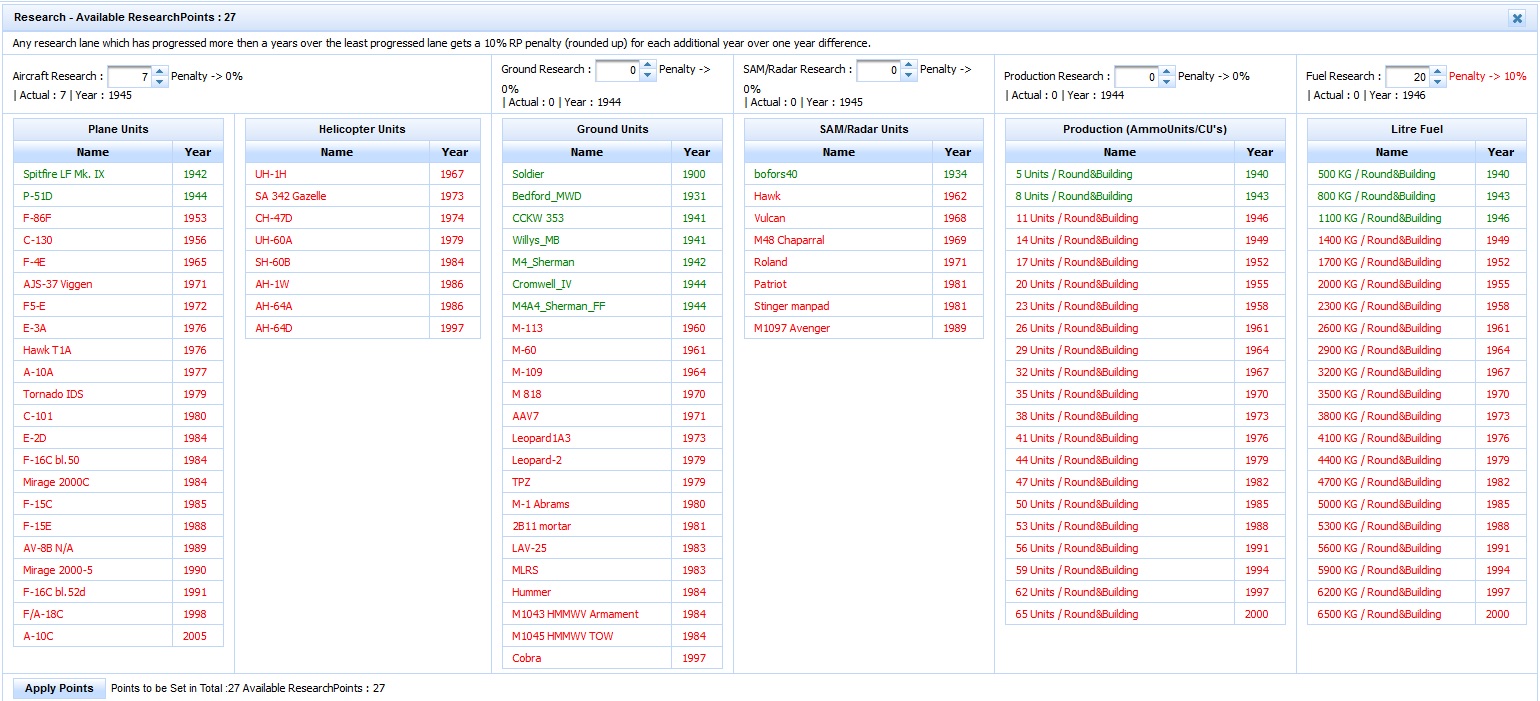User Tools
Sidebar
Research
Research is done by having science buidlings. These will automatically produce 3 research points (RPs) each turn (starting in the turn you built them). These are constructed the same way other buildings are, the difference being, that you need three stationed infantry units inside the CZ itself per science buidling.
Your generated RPs can be allocated to several research lanes, these being: aircrafts, helicopters, ground units, SAM/radar, production and fuel. For details about the lanes including units see Tech-Sides, for the production lanes see the table below.
Every lane has a representative year (starting at the year your game begins in). This year determines what units you can build or the amount your resource-buildings produce. Available units are marked green, while red ones are yet to be unlocked. If you manage to gather 10 RPs in one lane, you advance one year. The “Actual” number shows the amount of RPs spent in one lane and resets as soon as you reach 10 points.
As all lanes are researched seperatly, you can focus all points in one field or spread them as you wish. However, if you progress in a single lane, while others fall behind, you will suffer research penalties. As the research panel states: “Any research lane which has progressed more than one year over the least progressed lane gets a 10 % RP penalty (rounded up) for each additional year over one year difference.” [sic]
This penalty applies only after the points were put into a lane, meaning, if you start without penalty, you can spent e.g. 100 points in one lane in one turn, yet you would suffer no penalty. Would you however spent 20 points over 5 years, the penalty would increase steadilly.
To allocate points, you put the amount you want to spent above the respective lane and then press the “Apply Points” in the down most left corner. There you also see the amount of RPs you can spent and have allocated at the moment.
Production/Fuel-Lanes
| Production (AmmoUnits/CU's) | Litre Fuel | ||
|---|---|---|---|
| Units | Year | KG | Year |
| 50 Units / Round&Building | 1940 | 500 KG / Round&Building | 1940 |
| 62 Units / Round&Building | 1943 | 800 KG / Round&Building | 1943 |
| 90 Units / Round&Building | 1946 | 1100 KG / Round&Building | 1946 |
| 124 Units / Round&Building | 1949 | 1400 KG / Round&Building | 1949 |
| 161 Units / Round&Building | 1952 | 1700 KG / Round&Building | 1952 |
| 202 Units / Round&Building | 1955 | 2000 KG / Round&Building | 1955 |
| 245 Units / Round&Building | 1958 | 2300 KG / Round&Building | 1958 |
| 289 Units / Round&Building | 1961 | 2600 KG / Round&Building | 1961 |
| 336 Units / Round&Building | 1964 | 2900 KG / Round&Building | 1964 |
| 383 Units / Round&Building | 1967 | 3200 KG / Round&Building | 1967 |
| 432 Units / Round&Building | 1970 | 3500 KG / Round&Building | 1970 |
| 482 Units / Round&Building | 1973 | 3800 KG / Round&Building | 1973 |
| 533 Units / Round&Building | 1976 | 4100 KG / Round&Building | 1976 |
| 585 Units / Round&Building | 1979 | 4400 KG / Round&Building | 1979 |
| 638 Units / Round&Building | 1982 | 4700 KG / Round&Building | 1982 |
| 692 Units / Round&Building | 1985 | 5000 KG / Round&Building | 1985 |
| 746 Units / Round&Building | 1988 | 5300 KG / Round&Building | 1988 |
| 801 Units / Round&Building | 1991 | 5600 KG / Round&Building | 1991 |
| 857 Units / Round&Building | 1994 | 5900 KG / Round&Building | 1994 |
| 914 Units / Round&Building | 1997 | 6200 KG / Round&Building | 1997 |
| 971 Units / Round&Building | 2000 | 6500 KG / Round&Building | 2000 |
| 1028 Units / Round&Building | 2003 | 6800 KG / Round&Building | 2003 |
| 1086 Units / Round&Building | 2006 | 7100 KG / Round&Building | 2006 |
| 1145 Units / Round&Building | 2009 | 7400 KG / Round&Building | 2009 |

